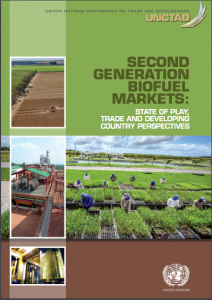 Second generation biofuels made from non-food biomass are here right now according to a new report from UNCTAD. “Second-Generation Biofuel Markets: State of Play, Trade and Developing Country Perspectives,” finds these biofuels are a commercial reality in the context of advanced technologies, economic pressures and a political will to act on climate change. The report focuses on the role advanced biofuels can play in meeting global climate and energy goals and how to make the technology available in developing countries.
Second generation biofuels made from non-food biomass are here right now according to a new report from UNCTAD. “Second-Generation Biofuel Markets: State of Play, Trade and Developing Country Perspectives,” finds these biofuels are a commercial reality in the context of advanced technologies, economic pressures and a political will to act on climate change. The report focuses on the role advanced biofuels can play in meeting global climate and energy goals and how to make the technology available in developing countries.
With a specific focus on cellulosic ethanol, the report provides a wide-ranging review of the second-generation biofuels sector, maps selected cellulosic ethanol projects, and details recent policy developments from around the world. A key factor in decreasing costs for the industry has been process improvements that have allowed the market to expand, the report finds.
The United States has the largest installed capacity for cellulosic ethanol production and the greatest number of working second-generation biofuel facilities, the report found, followed respectively by the People’s Republic of China, Canada, the European Union (EU) and Brazil. As of 2015, there were no cellulosic ethanol projects on the African continent and in Latin America (excluding Brazil); however, progress has been made in bagasse-fired electricity co-generation and biomass cook stoves in these regions.
The report finds two main strategies have given traction to the growth of advanced biofuels. The first is a market-segmentation strategy in conventional/advanced cellulosic biofuels used in the U.S., and more recently in the EU with the adoption of limits for conventional biofuels, resulting in premium pricing. The second is the availability of national development bank loans that have reduced risk and promoted growth in the industry, especially in China and Brazil. Low interest rates and a venture-capital culture have also played a role in advancing the position of second-generation biofuels.
The report concludes with five suggestions for the responsible development of the second-generation global biofuels industry and is an update from a similar UNCTAD report published in 2014.

